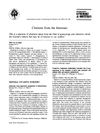 3 citations,
June 1995 in “International Journal of Gynecology & Obstetrics”
3 citations,
June 1995 in “International Journal of Gynecology & Obstetrics” Laser laparoscopy effectively reduces pelvic pain in women with mild to moderate endometriosis and is safe to use.
[object Object]  2 citations,
January 2021 in “JAAD Case Reports”
2 citations,
January 2021 in “JAAD Case Reports” Using a special laser and skin medication together successfully cleared a skin condition in a pregnant woman.
 2 citations,
March 2019 in “Lasers in surgery and medicine”
2 citations,
March 2019 in “Lasers in surgery and medicine” Higher light doses cause more damage to hair follicles, predicting better hair removal results.
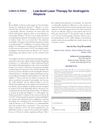 2 citations,
January 2014 in “International Journal of Trichology”
2 citations,
January 2014 in “International Journal of Trichology” Low-level laser therapy may increase hair density in pattern hair loss.
2 citations,
December 2012 in “Dermatologic Surgery” 2 citations,
November 2010 in “Obstetrics and Gynecology Clinics of North America” Laser therapy is a safe, effective, and preferred treatment for spider veins.
2 citations,
March 2010 in “Cosmetic Dermatology” Laser hair removal uses lasers to target and damage hair follicles to reduce hair growth.
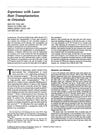 2 citations,
October 1998 in “Dermatologic Surgery”
2 citations,
October 1998 in “Dermatologic Surgery” Adjusting laser settings improved hair transplant results in Oriental patients.
1 citations,
January 2009 in “Elsevier eBooks” Lasers can reduce hair growth but may also damage skin.
 1 citations,
April 2023 in “Canadian journal of ophthalmology”
1 citations,
April 2023 in “Canadian journal of ophthalmology” Using a diode laser for hair removal without eye protection can cause serious eye injuries.
 1 citations,
January 2021 in “Journal of Dermatology and Dermatologic Surgery”
1 citations,
January 2021 in “Journal of Dermatology and Dermatologic Surgery” Taking Vitamin D supplements may increase the risk of skin darkening after laser hair removal.
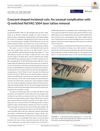 1 citations,
November 2020 in “Journal of Cosmetic Dermatology”
1 citations,
November 2020 in “Journal of Cosmetic Dermatology” A man got unusual crescent-shaped cuts from a laser tattoo removal due to a laser technical issue, but healed without scars.
1 citations,
September 2019 in “Hair transplant forum international” The laser-based microjet injector delivers tattoo pigment accurately with less tissue damage.
 1 citations,
March 2019 in “Lasers in Surgery and Medicine”
1 citations,
March 2019 in “Lasers in Surgery and Medicine” The conference reported improvements in muscle volume, skin cancer diagnosis, facial and vaginal rejuvenation, and hair growth using various laser treatments.
 1 citations,
September 2016 in “PubMed”
1 citations,
September 2016 in “PubMed” Using finasteride 0.5% solution with laser therapy significantly reduces unwanted facial hair in women.
1 citations,
October 2014 in “Journal of aesthetic nursing” Laser hair removal by trained professionals is the most effective long-term method for reducing facial hair in women.
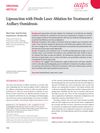 1 citations,
January 2013 in “Archives of Aesthetic Plastic Surgery”
1 citations,
January 2013 in “Archives of Aesthetic Plastic Surgery” Combining liposuction with laser ablation effectively reduces underarm odor with minimal side effects.
1 citations,
March 2011 in “WORLD SCIENTIFIC eBooks” Laser hair removal can be effective and safe for Asian skin with proper techniques and care.
1 citations,
November 2010 in “Obstetrics and gynecology clinics of North America” Gynecologists can make more money by offering laser hair removal because it's popular.
 1 citations,
February 2010 in “Proceedings of SPIE”
1 citations,
February 2010 in “Proceedings of SPIE” Low level laser therapy may help regenerate hair cells in the ear after damage from gentamicin.
1 citations,
January 2009 in “Elsevier eBooks” Using Eflornithine cream with laser treatments improves facial hair removal.

Laser therapy is effective for treating vascular lesions with the right light settings and trained professionals.
 September 2024 in “Pakistan Journal of Science”
September 2024 in “Pakistan Journal of Science” Laser treatments, especially low-level laser therapy, can improve hair growth, but more research is needed.
 September 2024 in “Electronic Journal of General Medicine”
September 2024 in “Electronic Journal of General Medicine” Laser hair removal can cause severe skin irritation, but it can improve with treatment.
 September 2024 in “Research Square (Research Square)”
September 2024 in “Research Square (Research Square)” Low-level laser therapy effectively treats hair loss and promotes hair growth.
 July 2024 in “Journal of Cosmetic Dermatology”
July 2024 in “Journal of Cosmetic Dermatology” Fractional laser therapy is a promising, effective, and minimally invasive treatment for hair loss.
 April 2024 in “International Journal of Women’s Dermatology”
April 2024 in “International Journal of Women’s Dermatology” Laser hair reduction can sometimes cause a rare skin condition called Fox-Fordyce disease.
[object Object]  February 2024 in “Lasers in Medical Science”
February 2024 in “Lasers in Medical Science” Lasers and energy-assisted methods show promise for treating hair loss, but more research is needed.

A portable imaging system shows promise for diagnosing skin diseases and checking laser treatment effects.
 September 2023 in “Journal of The American Academy of Dermatology”
September 2023 in “Journal of The American Academy of Dermatology” Raman spectroscopy is promising for measuring and enhancing drug delivery in alopecia treatments.




















